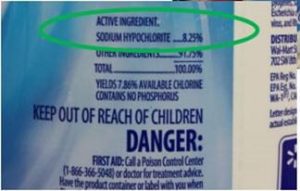Feb 15, 2021Texas A&M AgriLife celebrates National Pesticide Awareness Month
You probably wouldn’t buy an unfamiliar food product without looking at the label or take a new prescription without reading the instructions and warnings first.
The same care should be exercised when using pesticides, because the label is the law, according to a Texas A&M AgriLife Extension Service expert.


The U.S. Environmental Protection Agency, EPA, recognizes February as National Pesticide Awareness Month.
AgriLife Extension integrated pest management specialist Janet Hurley encourages the public to take the time to learn how to protect themselves and their families from the potential dangers pesticides can present when misused, mishandled or incorrectly stored.
Pesticides: For more than just ‘pests’
It’s not just about bugs, Hurley said.
“Most people don’t think pesticide safety is something they need to be concerned with,” she said. “But they don’t realize a lot of the chemicals they use day in and day out for cleaning, sanitizing and disinfecting — especially now with COVID-19 — those are all pesticides.”
Pesticides are regulated by the EPA and represent a broad category that applies to far more products than the average consumer would imagine. Everything from cleaning products and antimicrobials to herbicides and bug repellents are pesticides.
Read the label, then read it again
Consumers have been encouraged to read food labels for years, but pesticide labels haven’t received the same focus on education, Hurley said.
“The label is there to be read,” she stressed. “It will tell you everything you need to know—the active ingredients, if protective gear is needed, how much and how to use it, and potential dangers.”
She also said that it is necessary to read the label every time, as different brands and formulations can have different active ingredients and application instructions.
“Take disinfecting wipes for an example, it doesn’t matter who makes them or what brand, you must read the label,” Hurley said. “If you’re going to use one to wipe off a countertop that may be okay, but if you’re going to wipe down a large area you need to wear gloves. People need to read the directions and follow them. They don’t all have the same active ingredient.”
Following directions ensures the product is being used in the safest and most effective manner possible. It also means that you are utilizing it in the most cost-effective manner and not wasting product.
More doesn’t equal better
Using more of a product than its labeled usage isn’t going to make it work more effectively and can even be dangerous to people and pets, she said.
Some common home-cleaning mistakes are using products in a closed room with poor ventilation. Some products used together can even cause a deadly chemical reaction.
“Most of these things people just store under their kitchen or bathroom sink and don’t really think about having these things in the reach of children or pets either,” Hurley said.
She said that just as we want to be aware of what we expose our bodies to when it comes to the food we ingest and the water we drink, the same is true for the chemicals we are exposing ourselves to when using pesticides for cleaning, addressing pest issues or working in the garden.
“This isn’t a case where more is better,” Hurley said. “In order to protect ourselves and our environment we have to be aware, and that requires some level of self-education to know what you are using and how to use it.”
A helpful educational website both Hurley and the EPA recommend is the National Pesticide Information Center.
Safety indoors and out
Spring is coming and people are going to want to start doing things in their yards, she said, but it is important to keep best practices in mind inside and outside.
EPA assesses the risks and benefits of all pesticides sold and distributed in the U.S. and requires instructions on each pesticide label for safe use.
The EPA’s best pesticide awareness practices include:
- Storing pesticides in their original containers with proper labels.
- Storing pesticides out of the reach of children and pets, preferably locked up.
- Using the amount specified on the label.
- Washing hands with soap and water after using a pesticide.
- Keeping children and pets from entering sprayed areas until they dry.
- Keeping pesticides away from food and dishes.
- Washing clothes that have been in contact with pesticides immediately and separately from other items.














